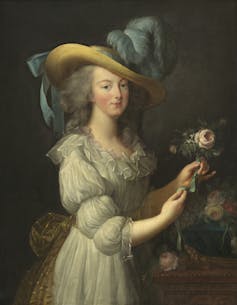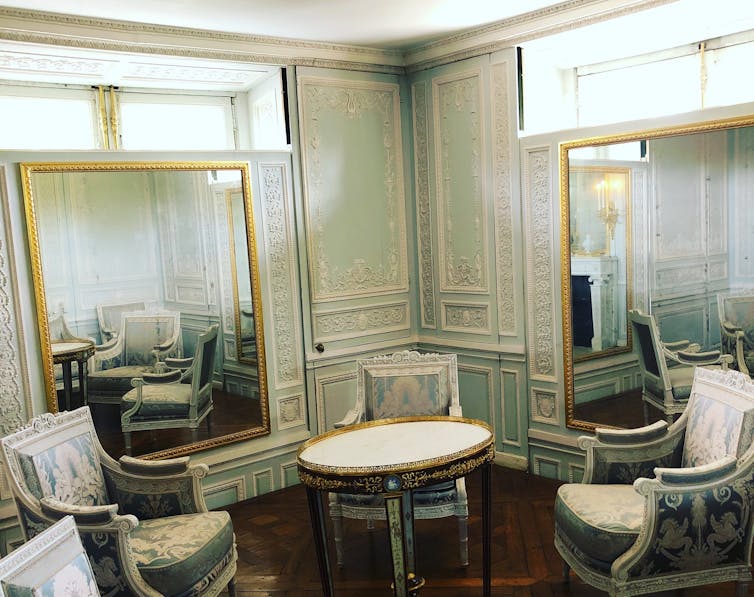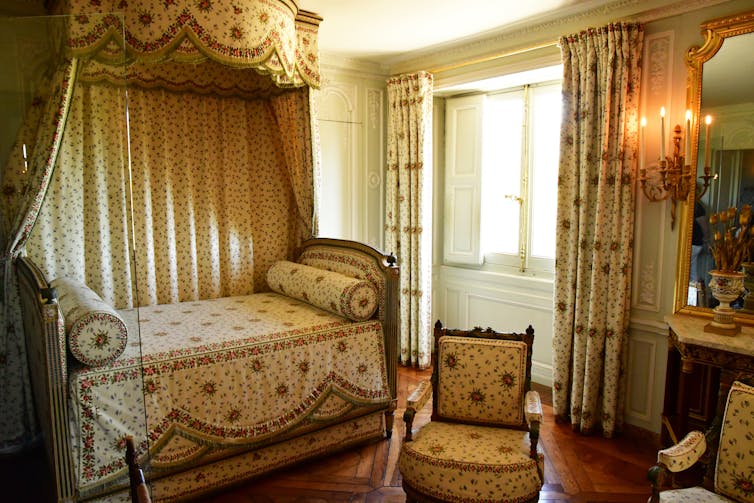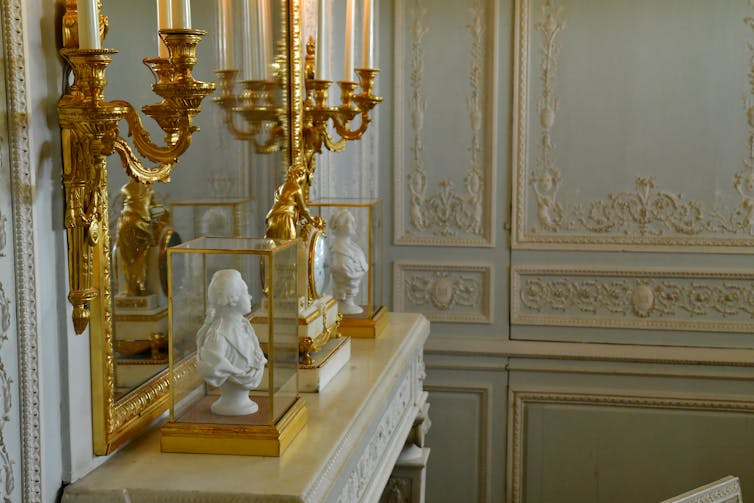If I could go anywhere: Marie Antoinette's private boudoir and mechanical mirror room at Versailles
- Written by Peter McNeil, Distinguished Professor of Design History, UTS, University of Technology Sydney
In this series we pay tribute to the art we wish could visit — and hope to see once travel restrictions are lifted.
Along a dusty path on the outskirts of the Château de Versailles lies my favourite destination: Queen Marie-Antoinette’s private bedroom and boudoir in the Petit Trianon (small trianon). Built for King Louis XV and his mistress Madame de Pompadour in 1768, it was gifted to the new queen of France by Lous XVI and refurbished after 1774.
It was already an extremely beautiful cuboid design by Ange-Jacques Gabriel, the height of neo-classical French taste. Its reconfiguration and that of the surrounding grounds by the queen saw it embody a raft of new ideas concerning everything from the education of children to what women should wear.
The bedroom and boudoir were rooms in which the queen retreated from the formality and etiquette of the main palace of Versailles to spend time with women friends. She assembled aristocrats such as the Princesse de Lamballe as well as famed portrait painter Elisabeth Vigée-Lebrun.
 Marie-Antoinette, by Elisabeth-Louise Vigee Le Brun, 1783, French painting, oil on canvas.
Shutterstock/Everett Collection
Marie-Antoinette, by Elisabeth-Louise Vigee Le Brun, 1783, French painting, oil on canvas.
Shutterstock/Everett Collection
Here the group wore a wardrobe not possible at formal assemblies: loose, tubular muslin dresses secured with a high sash, similar to juvenile girls’ clothes worn in England and the practical Creole summer dress they knew of from the French colony Louisiana.
The clothes were considered so scandalous that Vigée-Lebrun’s painting of the queen in such attire had to be taken down at the public Salon exhibition. The queen looked like she was in her underwear, the pose was too informal and the superfine muslin was likely imported from India. It was replaced by another portrait by Vigée-Lebrun of the queen in French silk, one of the many luxury trades that bolstered the French economy.
Read more: Friday essay: what is it about Versailles?
Boudoir to jardin
Leaving the formal apartment the ceilings suddenly lower. Framed by two large corner picture windows are views from the boudoir of the garden outside. But this is no ordinary garden.
French formal architecture had been characterised by geometrical designs in which trees and other plantings were clipped into axial vistas, often leading to sculptures or fountains indicating the status of the king, aristocrat or grandee who commissioned the work. The garden at Versailles was an abstraction in which viewing positions and plantings were subject to order, the ultimate act of control. Enormous canals mirrored the sky, unifying heaven and earth under the spell of their creator, Louis XIV.
From Marie-Antoinette’s window we see a simple landscape in which a large tree on the side anchors the “composition”. This was the new jardin anglais (English garden), claimed to embody ideas of liberty and freedom rather than French absolutism. Such gardens were anchored by asymmetrical lakes, elegant, classical pavilions as well as “ruins” (faked old structures, in which hermits sometimes resided) evoking melancholy and Romanticism.
Marie Antoinette’s private view looks rather like the wings of a theatre. Rather than a painting, we look out at nature, reframed by a set designer and man-made for wandering and thoughtful contemplation.
The 19-year-old queen was given exclusive use of Le Petit Trianon and made it her own.Read more: The great movie scenes: Sofia Coppola's Marie Antoinette
Magic mirrors
Light pours into the boudoir from several directions. It falls onto delicate wall panelling and a beautiful set of calcified, white gessoed furniture in the most advanced taste by Georges Jacob. The perfectly cubic space is small, accommodating only about four people comfortably, a contrast to court levées or assemblies for hundreds.
As evening comes, a miracle happens. From the basement kitchen-floor below, as directed by the queen, come two large glaces volantes (flying Venetian mirrors) to fill the window panes, raised by a series of weights and pulleys. The engineer Mercklein received 12,500 livres tournois (later francs) for this innovation (overall per capita income was about 250 per year); his system is now electrified.
 Mechanical mirrors emerge from the basement level to cover the windows.
Author, Author provided
Mechanical mirrors emerge from the basement level to cover the windows.
Author, Author provided
The room goes from day to night. Views of a garden, perhaps on a gloomy day in autumn, are replaced by the sparkling reflections of mirror. Large expanses of mirror glass could only be made in Venice until industrial espionage brought the technology to France. Mirrors perform important cultural work as they can infer vanity, falsehood or indeed show the truth. Animated guests were doubled and conversed like shadowy ghosts.
The queen and her circle could not be observed. Privacy, a new social conception that comes to govern middle-class life in the 19th century, now reigns. What a contrast to the Hall of Mirrors at the palace, where a sense of infinite repetition was created in a 73-metre-long gallery with 17 enormous windows and where hundreds of people thronged.
A reputation for scandal
Marie-Antoinette’s domain at Versailles was dominated by her frustration with a rigid court and her desire to embrace contemporary ideas. In her adjacent farmlet (the hameau), farm buildings were built to look shabby. Simulated wooden buckets of the finest porcelain by Sèvres lined the farmhouse stairs.
Following the educational ideas of Jean-Jacques Rousseau, Marie-Antoinette encouraged her children to plant seeds and dig the earth. She did not, as many believe, play at being a shepherdess or farmer. The woman who was erroneously claimed to have said of the hungry peasantry “let them eat cake” (this translates as brioche or sweet bread and was likely uttered by someone else), was simply trying to be a good mother as advocated by contemporary thinkers.
And what of the female friends? The queen was accused of running a tribadic or lesbian household. These scurrilous claims were designed to discredit her circle. Similarly, the bedroom shows no evidence to back the claim in an 18th-century English travel guide that Marie-Antoinette slept in a suspended bed-basket of roses.
 A bed fit for a queen, but no bed of roses to be seen.
Shutterstock
A bed fit for a queen, but no bed of roses to be seen.
Shutterstock
Read more: If I could go anywhere: Boughton House, ‘the English Versailles’ and its shimmering treasures
Later generations were not much interested in the queen’s motivations. She became an index of the profligate spending and obscene luxury of the old regime. She and her husband, as well as the Princess de Lamballe, were executed by the guillotine or in massacres between 1792 and 1793.
The mirrors were lowered, the furniture auctioned and the domain went to sleep until Empress Eugénie turned it into a museum honouring the queen.
A Swiss luxury brand has recently restored the rooms. They allow us to imagine a spirited woman married off from Austria aged 14, stripped of her foreign clothes at the French border, who became a lover of the latest French design and manufactures — rather than the debauched queen image we have inherited from the post-revolutionary period.
Wandering through the spaces I didn’t see ghosts. I did see the queen’s modern dress echoed in the brilliant white wall panels. She wandered a little in the distance towards the “temple of love” in her up-to-date garden. Her cracked mirrors are now nicely restored for the tourists.
 Simple, perfect luxury. Inside Marie Antoinette’s rooms at Petit Trianon.
Shutterstock
Simple, perfect luxury. Inside Marie Antoinette’s rooms at Petit Trianon.
Shutterstock
Authors: Peter McNeil, Distinguished Professor of Design History, UTS, University of Technology Sydney




